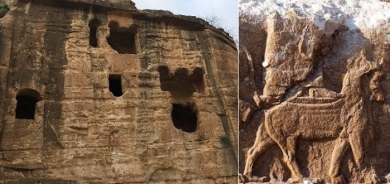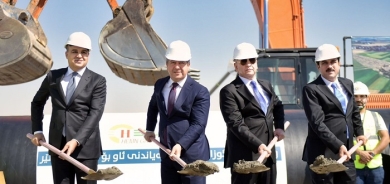Iran bunker site raises the nuclear stakes

The Fordo site near the holy city of Qom, 150 kilometres (90 miles) southwest of Tehran, has begun enriching uranium to 20-percent purity, the UN atomic watchdog Agency, said late Monday.
US State Department spokeswoman Victoria Nuland said that Iran's enriching of uranium to 20 percent at the site was "a further escalation of their ongoing violations with regard to their nuclear obligations."
"We call on Iran once again to suspend enrichment activities, cooperate fully with the IAEA and immediately comply with all Security Council and IAEA board of governors resolutions," Nuland told reporters in Washington.
Experts point out that the process of obtaining 20-percent enriched uranium represents the lion's share of the work needed to get the material purified to the level of 90 percent or above required for atomic weapons.
Iran, which says its nuclear activities are peaceful, says the material is for its Tehran research reactor to make isotopes for cancer treatments, but Western powers believe it has a much more sinister and destructive purpose.
"This is a provocative act which further undermines Iran's claims that its programme is entirely civilian in nature," British Foreign Secretary William Hague said, echoing the concerns of Washington, Berlin, Paris and elsewhere.
Mark Fitzpatrick from the International Institute for Strategic Studies (IISS) told AFP that the action brings Tehran "closer to being able to quickly produce enough fissile material for a nuclear weapon."
IAEA spokeswoman Gill Tudor said that all nuclear material "remains under the Agency's containment and surveillance" at Fordo.
But the fear is that if Iran decided to expel IAEA inspectors and enrich uranium to weapons-grade purity, Fordo would enable them to produce enough fissile material in a short space of time.
France called the move to enrich uranium at the mountain bunker a "particularly grave violation by Iran of international law."
This, Paris said, leaves "no choice but to strengthen international sanctions and to adopt, with our European partners and all willing countries, measures of an unprecedented scale and severity."
Israel is already preparing for Iran to become a nuclear power and has accepted it may happen within a year, the London Times reported, citing an Israeli security report.
Mark Hibbs from the Carnegie Endowment for International Peace think-tank said: "Israel, which has already warned Iran that it could take military action against installations, is very very worried by this facility ... We are moving into dangerous territory."
Enriching uranium is one of three main areas needed to develop a nuclear arsenal. Iran would also need to make the enriched uranium weapons-ready in a warhead and manufacture a missile to carry it to target.
A report from the IAEA in November, the agency's hardest-hitting to date, included evidence that Western powers said confirmed Iranian efforts in these other two areas.
The United States, the European Union and other allies have sought to tighten the screw since the report -- which Iran dismissed as "baseless" -- by targeting Tehran's crucial oil sector and its central bank.
But analysts said that Iran, which they say is clearly feeling the pinch from the heightened sanctions, could also be planning to use Fordo to strengthen its hand in talks with the West.
"They appear to have taken the decision to acquire a nuclear weapons capability, but not a decision to build the bomb. And that means that they can be dissuaded from doing that," said Albright, now at the Washington-based Institute for Science and International Security (ISIS).
"Because of the opaque nature of leadership in Iran and the lack of deep knowledge on how the leadership is thinking, this escalation could represent an effort by Iran to stake out a tough negotiating position," echoed Hibbs.
Tensions have also been stoked by Iran showing off what it said was a CIA drone it captured using cyberwarfare, while in October Washington alleged Iranian involvement in a suspected plot to assassinate the Saudi ambassador to the US.
Iran, where a judge on Monday reportedly sentenced to death a US-Iranian former Marine for "membership of the CIA", has also threatened to close the Strait of Hormuz, a chokepoint for 20 percent of the world's oil.
US Defense Secretary Leon Panetta warned on Sunday that any such move would cross a "red line" and "we would take action and reopen the strait."
Meanwhile Nuland condemned the death sentence handed to US-Iranian ex-Marine Amir Mirzai Hekmati in Iran and said allegations that he worked for the CIA were "false."
Iran's supreme leader Ayatollah Ali Khamenei said that Tehran will not bow to sanctions, in comments broadcast on state television on Monday.













